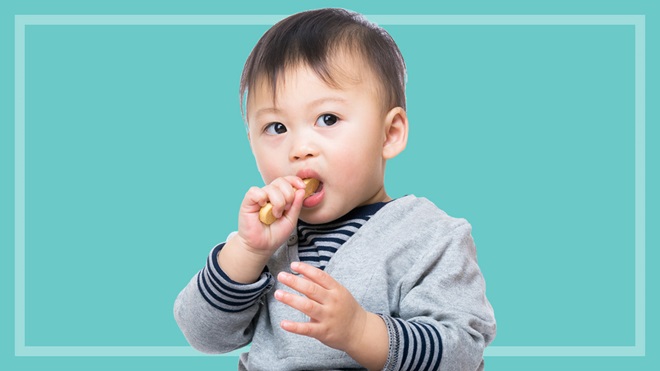Need to know
- Obesity in young children is increasing. 2-5 year olds today are twice as likely to be obese as those 20 years ago
- Of 57 toddler snack products surveyed, nearly half contained more than 25% sugar
- Sweet ingredients derived from fruit act like added sugar as far as health effects are concerned
Jane Martin, executive manager of the Obesity Policy Coalition, explains why added sugar labelling would help parents make informed decisions on what foods to give their children.
Australians consume too much added sugar and our toddlers are no different, with nearly a third of their daily energy intake coming from processed, unhealthy foods, including many which are high in added sugar.
Eating too much added sugar in processed foods contributes to excessive weight gain and obesity. Increases in the availability and consumption of processed foods by children mean that we're seeing the sharpest increase in obesity among very young children, with children aged two to five now twice as likely to be obese as they were 20 years ago.
Children aged two to five are now twice as likely to be obese as they were 20 years ago
In young children, regularly eating sweetened packaged foods can affect taste preferences, which is one of the reasons why Australian Dietary Guidelines recommend we limit sweet foods for young children.
But the majority of toddler snack products contain sugar – even when they are savoury.

Heinz were fined in 2018 over the misleading marketing of their Little Kids Shredz products.
Industry tactics
Food companies use sophisticated marketing tactics and have convinced governments to trust them to police themselves. It can therefore be confusing and difficult for busy parents to choose healthy options for their toddler.
This was highlighted by the Federal Court's decision in August 2018 to fine Heinz $2.25m over the misleading marketing of their Little Kids Shredz products, that were up to 68% sugar. Documents revealed in the court case show how the packaging was updated to create the image of a healthy and nutritious snack that would appeal to parents of toddlers.
The majority of toddler snack products contain sugar – even when they are savoury
We are seeing more and more packaged products seeking to capitalise on time-poor parents looking for a convenient option on supermarket shelves. Many products are dressed up to appear healthy, but trying to find a healthy option means relying on the advice on labels and packaging.
When labels boast "99% fruit and veg", and obscure the fact that they are actually high in sugar, who can blame anyone for choosing such products for their kids?
Toddler products laden with added sugar
We surveyed 57 toddler snack products in major supermarkets to highlight just how pervasive added sugar is. Nearly half the products surveyed contained over 25% sugar, with up to six different sweet ingredients contributing to the total sugar content.
Many of the sweet ingredients (such as fruit juice, fruit juice concentrate and fruit pastes) had been derived from fruit, which is still added sugar as far as its effects on health are concerned. However, under current labelling rules it's impossible to tell what is added sugar and what is naturally occurring, such as in whole fruit.
Food manufacturers know that people associate the word 'fruit' with health. Many take advantage of this, plastering it over packaging, and we're seeing this trend more frequently on products aimed at toddlers.
Food manufacturers know that people associate the word 'fruit' with health
The reality is that a lot of these products contain highly processed fruit products, the processing of which results in an ingredient high in sugar and low in fibre and other nutrients, such as juices and fruit concentrates. These products are often significantly modified and do not reflect the nutrition content or fibre benefits of the whole fruit from which they were derived.
Parents deserve to know what's really in the products they're feeding their kids. Currently, that is hard to find as added sugars are not grouped together on the ingredients list or listed separately on the nutrition information panel. With 60+ different names for sugar, even the ingredients list can't always be relied upon to help parents make an informed choice.

Added sugar labelling would have a positive impact on reducing obesity rates.
Added sugar labelling to help inform parents
With food ministers meeting in early November, we want them to use this as an opportunity to make added sugar labelling mandatory and help not just parents, but all consumers.
Some small changes to the way added sugar is represented could make a big difference:
- The amount of added sugar should be shown separately from naturally occurring sugars in milk, yoghurt and unprocessed fruit in the ingredients list and on the nutrition information panel.
- We must ensure the definition of added sugar captures sugar from highly processed fruit ingredients such as fruit juice, fruit paste and fruit juice concentrates.
We know that adequate food labelling on packaged foods can help inform people's purchasing habits, and also have a positive impact on reducing obesity rates. We owe it to our youngest Australians to give them the healthiest start in life.
We're on your side
For more than 60 years, we've been making a difference for Australian consumers. In that time, we've never taken ads or sponsorship.
Instead we're funded by members who value expert reviews and independent product testing.
With no self-interest behind our advice, you don't just buy smarter, you get the answers that you need.
You know without hesitation what's safe for you and your family. And our recent sunscreens test showed just how important it is to keep business claims in check.
So you'll never be alone when something goes wrong or a business treats you unfairly.
Learn more about CHOICE membership today
Stock images: Getty, unless otherwise stated.



